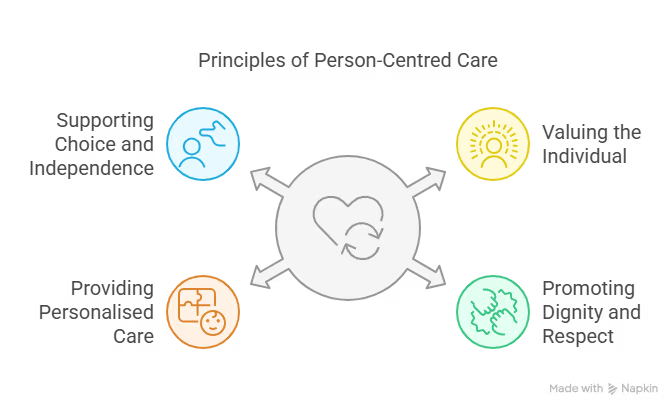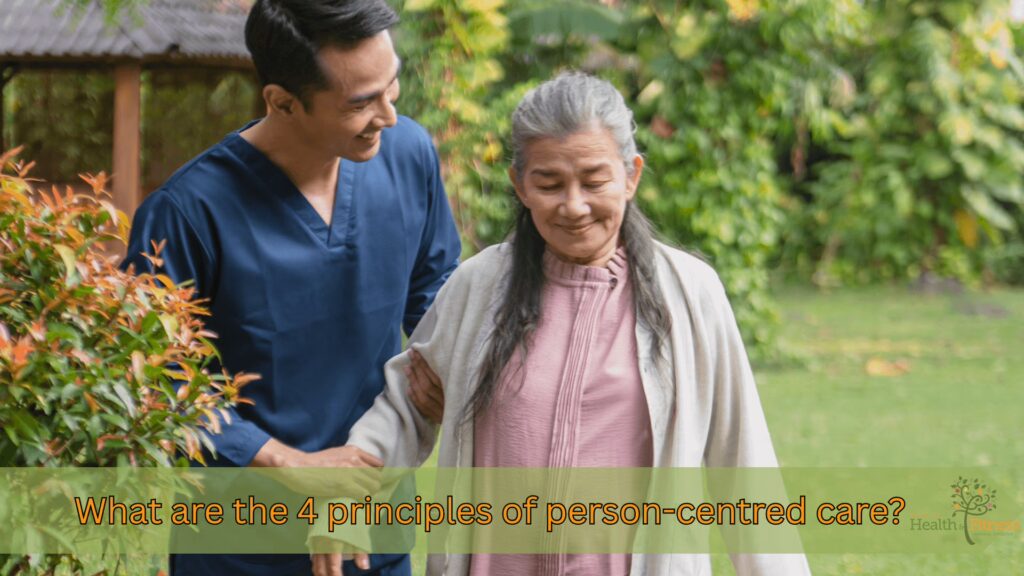Have you ever felt truly listened to—like your needs, wishes, and daily routines actually mattered? For many people receiving care, that simple feeling of being respected can make all the difference. In fact, person-centred care is now considered one of the gold standards in health and social care, with the NHS and CQC placing increasing focus on it.
This approach is built on four key principles: valuing the individual, promoting dignity and respect, offering personalised care, and supporting choice and independence. These principles help carers provide support that’s not only safe—but meaningful, respectful, and empowering.
By reading this blog, you’ll discover:
- What the four principles of person-centred care actually mean
- How to apply them in real-world care settings
- Why they matter for Level 5 health and social care learners
- Practical examples and care plan insights
- Key values and government frameworks that support this approach
What is Person-Centred Care?
Meaningful activities are not just about keeping residents busy. They’re about connecting with each person’s identity, history, and interests. These can be creative, social, physical, or reflective. What matters most is that the activity brings purpose and enjoyment.
Care homes offer a wide range of these activities, from arts and crafts to light gardening. The goal is always the same: to support care home residents in staying mentally and physically active, socially connected, and emotionally supported.
If you’re working in care or planning a career in adult social care, it’s important to understand how to apply these principles. The Level 3 Diploma in Health and Social Care covers key strategies that help personalise care planning and activity delivery in line with individual needs.
The 4 Principles of Person-Centred Care
In the UK, person-centred care is considered a cornerstone of good practice in health and social care. According to Skills for Care, services that adopt person-centred approaches see improved staff retention and higher care satisfaction. These four principles provide a simple guide to delivering care that truly puts the individual first.

1. Valuing the Individual
Everyone receiving care has a life full of stories, routines, beliefs, and personal preferences. Valuing the individual means recognising their unique identity and ensuring that support reflects who they are—not just what they need.
The Social Care Institute for Excellence (SCIE) states that when individuals feel known and respected, they’re more likely to trust their care team and engage in decision-making. For example, including someone’s cultural background in a care plan can reduce distress and build stronger relationships.
2. Promoting Dignity and Respect
Dignity and respect are not just ideals—they are rights under the Care Act 2014. This principle focuses on safeguarding privacy, using kind language, and allowing individuals to make their own choices.
According to NHS England, 1 in 4 complaints in care settings involve breaches of dignity—showing how essential it is to make this a daily focus. Simple acts like knocking before entering a room or asking before assisting can preserve a person’s sense of self-worth.
3. Providing Personalised Care
Personalised care is about adapting support to match each person’s lifestyle, medical needs, and values. It avoids one-size-fits-all solutions and ensures that care feels relevant and empowering.
The King’s Fund notes that personalised care leads to better health outcomes, especially for people with long-term conditions. In fact, when people are actively involved in shaping their own care plans, NHS research shows they are 40% less likely to be admitted to hospital unnecessarily.
4. Supporting Choice and Independence
Giving individuals control over daily decisions—like when to eat, what to wear, or who supports them—can significantly improve wellbeing. Even small choices make a big difference.
The Care Quality Commission (CQC) highlights that when people feel involved and independent, services are more likely to be rated “Good” or “Outstanding”. Encouraging independence also builds confidence and reduces over-reliance on staff.
Health and Social Care Level 3 Diploma
Person-Centred Values: How Many Are There and What Do They Mean?
There are eight core values that form the foundation of person-centred care. These values ensure that support is tailored, respectful, and genuinely focused on the person—not just their condition. They guide how care is planned, delivered, and reviewed in health and social care settings.
Below is a breakdown of what each value means in simple terms:
1. Dignity
Treating people with honour and respect, no matter their age, background, or ability. It means never doing anything that might embarrass, shame, or undermine someone.
2. Respect
Listening to people’s views, recognising their rights, and accepting their choices—even if they differ from your own. Respect helps build trust in care relationships.
3. Compassion
Showing kindness, understanding, and a willingness to help. Compassion creates emotional safety, especially when people feel vulnerable or distressed.
4. Choice
Letting people decide how they want to live and receive care. This includes daily decisions, like what to eat or when to go to bed, and bigger ones, like choosing treatment options.
5. Independence
Encouraging people to do as much as they can for themselves, with support when needed. Independence helps maintain self-esteem and confidence.
6. Inclusion
Making sure everyone is involved in social life, community activities, or conversations—especially those who may feel isolated. Inclusion prevents loneliness and supports mental health.
7. Rights
Recognising and protecting a person’s legal and human rights, such as privacy, freedom of expression, and the right to make choices about their own life.
8. Partnership
Working together with the person receiving care, their family, and other professionals. Partnership leads to better outcomes and makes care more coordinated and consistent.
Person-Centred Care in Practice
Effective care plans are essential in person-centred care. A care plan should be developed with the service user and outline their preferences, goals, and needs. This makes the support more relevant and personalised.
For example, if a service user prefers a specific routine in the morning, the care plan should reflect this. Working in a person-centred way means adapting to the individual—not the other way around.
If you’re working in care or considering a career in adult social care, mastering these principles is essential. The Level 3 Diploma in Health and Social Care provides valuable training on personalising care plans and adapting activities to meet the unique needs of individuals, ensuring a more meaningful and effective approach to care.
Benefits of Person-Centred Care
Person-centred care enhances the quality of care by fostering trust and improving outcomes. Service users feel more satisfied and engaged when they are actively involved in their care.
From improved mental health to reduced hospital admissions, the benefits of person-centred care go beyond comfort—it leads to real health improvements.
For those looking to move into leadership roles within care settings, the Level 5 Diploma in Health and Social Care offers crucial insights. It helps equip you with the knowledge to lead teams in delivering personalised care activities that enhance dignity and promote overall wellbeing.
Barriers to Person-Centred Care
Despite its benefits, challenges remain. Common barriers include:
- Time constraints
- Limited staff training
- Poor communication
- Inflexible systems
Addressing these issues requires organisational commitment and proper training for staff.
FAQ
1. What are the four principles of person-centred care?
They are: valuing the individual, promoting dignity and respect, personalised care, and supporting choice and independence.
2. What are the 4 P’s of patient-centred care?
Personalisation, Participation, Protection, and Partnership—each focuses on involving and safeguarding the individual.
3. What are the 4 C’s of person-centred care?
Compassion, Communication, Collaboration, and Choice—all key to building respectful and responsive care.
4. What are the 5 principles of the person-centred approach?
They include respect, trust, partnership, understanding needs, and promoting independence.
5. What are the 4 person-centred values?
Dignity, Respect, Compassion, and Choice are often highlighted as core person-centred values.
6. What are the 4 Ps of person-centred planning?
Purpose, People, Place, and Plan—used to create personalised, meaningful support pathways.
Final Words
Understanding and applying the four principles of person-centred care leads to better support, stronger relationships, and higher-quality outcomes. When care is tailored, respectful, and inclusive, everyone benefits—especially the person at the heart of it.
Whether you’re a learner or a practitioner, embracing these values transforms the care experience into something truly personal and effective.















